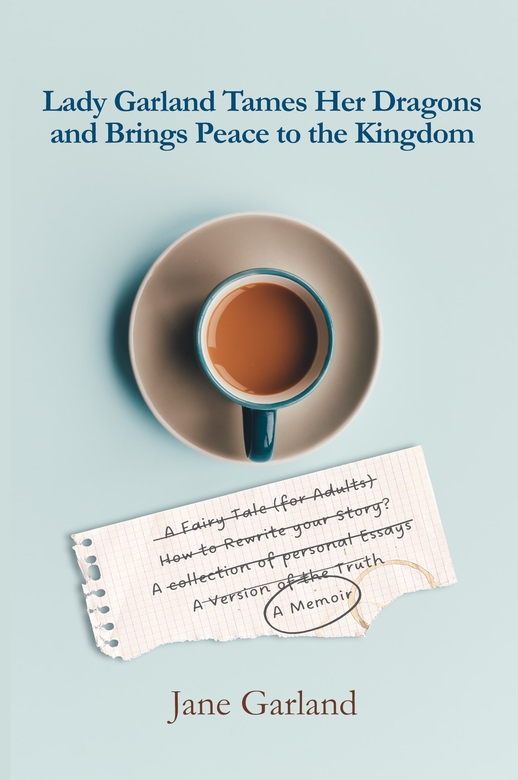
Author Jane Garland welcomes readers into the messy realm of her life in Lady Garland Tames Her Dragons and Brings Peace to the Kingdom, a clever, heartfelt, and deeply revealing memoir. Though pitched as a fairy tale for adults, this metaphor-laden memoir is playful and nakedly honest, but also academically appealing and philosophically rich. Garland can recount a painful anecdote in one breath, and then impartially dissect her relevant reactions and emotions in the next.
As the title implies, Garland has had a great many battles in her past, and now having found something akin to peace, she has chosen to bestow her learned wisdom upon the world. What results is part vulnerable memoir, and part life guide for both abstract and universally relatable struggles, i.e., money, professional frustration, independence, parental efficacy, medical crises, fear of climate change, and more. These issues are the titular “dragons,” the challenges that have reared their ugly heads in her life, from schoolyard traumas and existential dread to chronic illness, rampant anxiety, and patterns of catastrophic thinking.
The majority of the stories come from 2020 onwards; as the world wrestled with Covid and the mounting death toll, Garland and her family were dealing with a terrifying illness in their own home, one that some experts don’t even believe exists. Overcoming the uncertainty and pain of a mysteriously sick child, while the world continues to be ravaged by an invisible virus, makes for intense emotional peaks and valleys, which Garland captures and recounts with impressive clarity. Simultaneously, Garland was embarking on a personal journal of self-discovery, with the goal of somehow helping to save the world, even if that meant dipping her toes into the stock market and areas of study she’d never considered before.
Some of the chapters begin with thought experiments or mood-setting language, such as “Imagine you’re walking through a forest.” This dreamy approach to exposition does maintain the fantasy theme of the book, along with the anthropomorphized dragons that crop up in her narration, but there isn’t a consistent throughline of a fairy tale, as the title might promise. The book is more a series of vignettes and extended opinions about her own life experiences, though some readers will be unaware that this is a memoir, and not a work of fiction, given her approach.
The language throughout is unique to memoirs – penned with the passion of an extemporaneous rant, but also polished with perfect one-liners and an economic language use that lands memorably. Some of her stories could be read as “woe is me, life is hard,” but these are tempered by Garland’s self-effacing preface, where she directly addresses her position as a privileged white woman, setting a tone of self-awareness and savage honesty, while also defending the right to speak her unique truth. There isn’t much discussion of race and white privilege, but the reflections on her time in Charleston touch on a range of social justice issues and controversial subjects that deserve more space in every person’s mind.
All in all, Garland is a skilled writer, a keen observer of herself and others, and she has the ability to glean incisive wisdom from struggle, sharing those lessons with empathy and erudition for a post-pandemic audience.
Book Links
STAR RATING
Design
Content
Editing
Get an Editorial Review | Get Amazon Sales & Reviews | Get Edited | Get Beta Readers | Enter the SPR Book Awards | Other Marketing Services























Leave A Comment